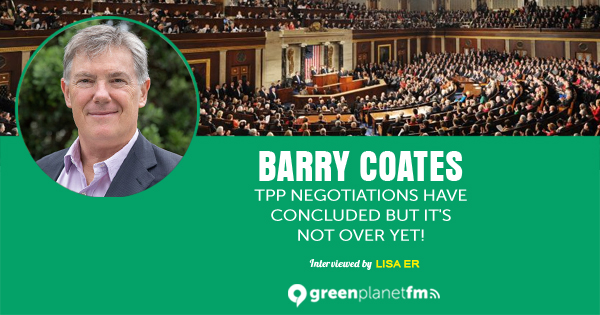
This time it is over a complex international treaty – the Trans-Pacific Partnership Agreement, TPPA (often referred to as the TPP). The negotiations were kept secret for six years, and for good reasons. Analysis of the final agreement shows that the TPPA is not in our interests. Beyond the spin and myths, there are three hard truths about the impacts of the TPPA on New Zealand.
Firstly, the government says that the TPPA will deliver significant benefits to New Zealand economy. According to the government’s own figures, our national
income (GNP) would be 0.9% higher by 2030 with the TPPA. Without the TPPA, GNP would increase by 47% by 2030. So the TPPA would add less than
1% to an expected increase of 47%. This is not a significant benefit.
The results of research that I co-authored with Professor Tim Hazledine from University of Auckland, Dr. Geoff Bertram from Victoria University in Wellington and ex NZ Herald business journalist Rod Oram showed that even the 0.9% increase in GNP is grossly exaggerated, since most of the increase results from removing ‘non-tariff barriers (ie. regulation on business). But these regulations including legitimate protection of our environment, public health and other aims, raising the likelihood of even more leaky buildings, Pike River disasters and finance company collapses from so called ‘light’ regulation. The savings that resulted from the economic modelling were so speculative that the government arbitrarily halved the number. Even after doing so, the gains from removing ‘non-tariff barriers’ still accounted for most of the projected benefit from the TPPA. These are ideologically-driven, speculative numbers that have little credibility.
There are tangible savings from tariff reductions, primarily in agriculture. These tariff reductions of around 1% of exports are smaller than some daily movements in global dairy prices or exchange rates. They are not significant for farmers. And these gains come at a price. The TPPA falls far short of the promised ‘gold standard’ agreement, and locks in continued tariffs in sectors like dairy and beef for Japan, Canada and the US.
The TPPA also allows the US and other countries to continue to use massive agricultural subsidies that allow them to compete unfairly. The US Congressional Office has estimated US agricultural subsidies may total $1 trillion over the next decade, accounting for up to 40% of costs of production for dairy farmers. This is unfair trading that is allowed under the TPPA.
The only viable forum to restrict agricultural subsidies is the World Trade Organisation (WTO). The US has been under pressure to give concessions on agricultural subsidies in order to get advantages such as stronger patent rights and longer copyright periods. The TPPA now provides these benefits to the US without needing to negotiate in the WTO. The ink had hardly been dry on the TPPA before the US announced that it wanted to end current WTO Doha Round negotiations that are focused on agriculture. The TPPA is an own goal. New Zealand just gave away the best chance to tackle the serious trade distortions arising from agricultural subsidies.
The TPPA would deliver tiny economic benefits, and government spin has tried to make them look as good as possible by not only exaggerating the benefits but also by excluding any of the costs in their modelling. The costs include extension of copyright from 50 to 70 years, additional costs for longer data exclusivity for biologic medicines, costs to consumers from internet restrictions, additional legal fees and administrative costs for central and local government, the costs of being sued by foreign corporations and the costs of defending cases. It is likely that the costs will far outweigh the benefits. The TPPA does not stack up economically, let alone if the analysis included the non-economic impacts on the environment, health, quality of life, inequality and the loss of democratic rights and sovereignty.
Secondly, the government says the TPPA is just a Free Trade Agreement and we have lots of those. They have been good for us and we haven’t yet been sued. This needs unpacking. The TPPA is mostly not about tariffs and quotas, but about so-called ‘internal barriers’ to foreign companies. These are the laws and regulations that get in the way of business, even if they also have a role in protecting the public interest. Removing the government’s right to regulate may be good for business but it’s not good for the environment or public health or human rights.
The government has given assurances that exceptions in the TPPA retain the rights of government to regulate in the public interest, but research papers on the environment, public health and Treaty of Waitangi show these exceptions are likely to be ineffective. It is particularly risky not to have any carve out for action on climate change. References to climate change in earlier drafts of the TPPA were removed, and the absence of even a mention of climate change anywhere in the 6000+ page agreement creates real regulatory uncertainty for the future.
The TPPA has a powerful and controversial way of getting rid of regulatory ‘barriers’ in the form of an Investor-State Dispute Settlement (ISDS) mechanism that allows investors the right to sue governments in an international tribunal. This may have made sense when Third World dictators were nationalising foreign investment, but that’s not the case for New Zealand or the other TPPA countries. Under ISDS, foreign investors are able to take cases in an international tribunal without even going through New Zealand’s judicial system. To make matters worse, the tribunals have rampant conflicts of interest, no appeals mechanism and little transparency.
In a 2014 article, the Economist called ISDS implementation “disastrous”. Most of the 650 ISDS cases so far have been against environmental regulations and have included cases on mining, renewable energy, fracking, toxic chemicals, workers’ rights, affirmative action in post-apartheid South Africa, the Philip Morris case against Australia’s law on plain packaging for cigarettes and recently, the claim for US$15 billion over President Obama’s rejection of the Keystone XL pipeline.
The Key government has tried to reassure the public that New Zealand already has ISDS provisions in free trade agreements, but we have never been sued. But this is mainly because investors from those countries have made 11 ISDS claims compared with 111 from TPPA countries, including the US with the most litigious corporations. It is misleading to say that we won’t be sued because we haven’t yet been sued.
The Key government also justifies the TPPA by pointing out that trade rose significantly after we signed the China Free Trade Agreement (FTA). But all commodity producers expanded exports significantly to China over the past decade, whether or not they have had an FTA. And the experience of Australia should give a warning. The Australian Productivity Commission study in 2010 found that Australia had gained no benefit from their FTA with the US, and had assumed additional risks. It is misleading to say that we are likely to gain huge benefits from the TPPA because we exported more after agreeing the China FTA.
In reality, we are opening ourselves to the potential of costly and damaging claims by foreign corporations. Even if we win the cases, there is a chilling effect. Defending itself against cigarette manufacture, Philip Morris cost the Australian Government over A$50 million. Future governments will shy away from any laws that might adversely impact on the profitability of foreign investors, even if there are benefits for New Zealand society.
Thirdly, the government has said the TPPA is a 21st Century agreement. This is far from reality. TPPA is an attempt to lock in failed policies of the past, favouring deregulation and privatisation, and pushing New Zealand further towards the US model of patents, public services and corporate influence over policy making. This is not a good model for New Zealand to follow.
The TPPA is not even good for business overall. It gives new rights and opportunities to foreign corporations, while further disadvantaging small and medium enterprises that already have to compete with far larger multinationals that are able to avoid paying tax, use predatory pricing and other anti-competitive practices that are not regulated internationally.
If you asked most people whether the priority should be to give more advantages to foreign corporations or whether it should be to better regulate the multinationals and help local business, it is unlikely that the answer would be the TPPA. We need very different kinds of agreements for the 21st Century.
Other countries are moving away from agreement like the TPPA. Brazil has never signed agreements with ISDS provisions; South Africa, India, and a number of Latin American countries are unwinding ISDS agreements; France and Germany are opposed, and the EU has rejected ISDS.
We need agreements that will allow governments to regulate foreign corporations in the public interest, that support environmental protection, climate change, public health and human rights, and that create space for thriving local business and local communities.
But first we need to reject the TPPA. Signing the TPPA is largely symbolic. Ratification of the TPPA by countries representing 85% of its combined GNP is required to bring the TPPA into force. The TPPA is unlikely to be ratified in the US until the new President is in office, or it may be rejected (leading candidates oppose the TPPA). And Canada has undertaken to consult widely and undertake objective analysis before deciding whether to ratify.
It would be foolish for New Zealand to change our laws to comply with the TPPA before ensuring that others will ratify, but that is what the government plans to do. There will be campaigning around the Select Committee hearings and legislative changes in Parliament, but with a slender majority, possibly bolstered by the support of Phil Goff, the government will be able to pass the TPPA.
However, this may be short-lived. The majority of the public are against the TPPA, according to a TV3/Reid Research poll in November last year. A future government could decide not to participate in the TPPA before it comes into force (unlikely to occur before 2018) or even though it is likely to be economically costly and politically difficult, withdraw after it is in force.
The government and much of the media are sounding increasingly desperate as they launch expensively designed web pages and go on a roadshow. Their government’s problem isn’t that they have failed to ‘sell’ the TPPA, it is that the public doesn’t want to buy it. The good news is that the TPPA won’t come into force before the next New Zealand election, and whether or not it is ratified, the TPPA will be a crucial issue in that election. New Zealanders will finally have an opportunity to decide on the TPPA, and by implication, the kind of society we want for the future.
Barry Coates is spokesperson for It’s Our Future – Kiwis against the TPPA, a candidate on the Green Party list (next into Parliament), developer of a sustainability programme at the University of Auckland Business School and former CEO of Oxfam New Zealand 2003-14.
